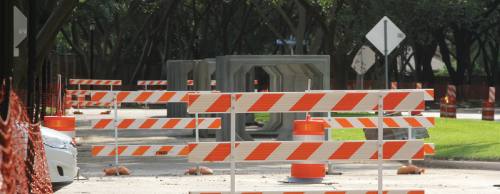Houston City Council approved a 15-year, $2 billion plan July 24 to improve the city’s sewer systems and prevent persistent overflow problems. The decree also includes an immediate $4.6 million settlement payment from the city, most of which goes to the Environmental Protection Agency for Clean Water Act violations.
The decree now goes before a federal judge for approval and enters a 30-day public comment period before it is enacted.
The estimated $150 million per year increase in public works funds dedicated to sewer system improvements will be funded by increased water rates, Mayor Sylvester Turner said. An ongoing rate study will wrap up by January 2020, and new rates will be applied to water bills in April 2020, said Carol Haddock, the director of the Houston Public Works Department. The EPA defines water bills below 2% of a city's median income as affordable, Haddock said.
"The city of Houston is currently closer to 1% of median household incomes, and even with the scheduled cost of the scheduled adjustments that are part of the rate study that we're going into, we expect to be significantly below the 2% at the end of the 15 years," she said. "At this point, everything has every indication that we had those that will still be well within the realm."
The lone dissenting vote came from District G Council Member Greg Travis, who said the performance standards outlined in the decree are not specific enough and could open the city up to unforeseen financial penalties from the EPA.
"I do not see performance standards that are measurable," he said. "There are a number of areas that have open-ended items on them. ... We don't know the total costs we are subjecting ourselves to"
The public input and community engagement process for the terms of the decree came under public scrutiny by environmental nonprofit group Bayou City Waterkeeper for giving Houston residents little time to review the decree’s requirements before final approval. The group also questioned how the city would notify the public about ongoing progress of the sewer projects.
Bayou City Waterkeeper sent a letter to the city’s legal team July 23 urging a more robust public input process, including a request to the federal judge to extend the public comment period and for a dedicated website for updates on sewer projects and community engagement meetings.
The mayor's office rejected adding these specific suggestions, an internal memo states; however, the public engagement process will continue throughout the 15-year process, Turner said. The public works department plans to continuously update its website with the projects' progress, Haddock said.
"As information and documents become available, we will continue to build that [public works] website," Turner said. "At this point it is just documents that are that are available, but we will build out the full public information for public engagement. We will not only use the website, we will be in the community, and there will be committees working with super neighborhoods and civic clubs as we move along the way in this process and we still welcome people to input."
Jordan Macha, the executive director of Bayou City Waterkeeper, said the engagement efforts detailed by Turner on July 24 were "a step in the right direction."
"The questions that City Council Members had in their closing remarks, especially those calling for public works to provide a summary overview of the consent decree to City Council, is an important reminder that many residents want to know and understand what is happening in their city," Macha said. "It's not enough that presentations and Q&A will happen at City Council or committee meetings. These should done at a time that the average interested person could attend. This is what Bayou City Waterkeeper offered to the City Council in our Community Engagement Plan."
Details of the decree
The decree requires the city to perform an assessment of sanitary sewer overflow issues and whether they necessitate greater drainage capacity within the system, which includes 6,000 miles of sewers and 39 treatment plants. It also requires the city to conduct a conditions assessment of the wastewater collection system every 10 years as well as a conditions assessment of wastewater treatment plants every five years. More requirements include a sewage system cleaning plan to prevent overflow issues and the implementation of over 3,000 “smart manhole covers,” which digitally monitor for potential overflow issues.





